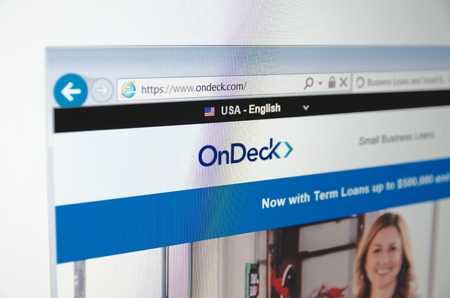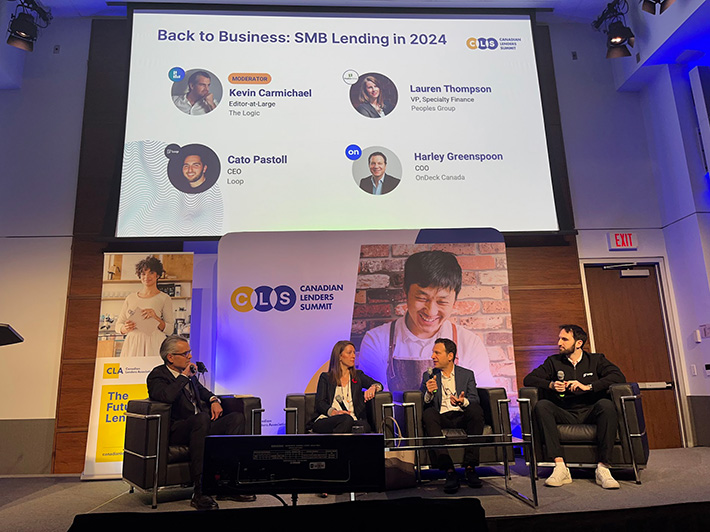Business Lending
Intuit’s SMB Loans Relatively Flat Year-over-Year
December 18, 2023 Intuit originated $279M worth of term loans to small business for the fiscal quarter ending October 31. This is down from the $314M originated over the same time period last year.
Intuit originated $279M worth of term loans to small business for the fiscal quarter ending October 31. This is down from the $314M originated over the same time period last year.
“As of October 31, 2023 and July 31, 2023, the allowances for loan losses on term loans to small businesses were not material,” the company wrote in its earnings report.
Further, Intuit said that “In August 2023, we entered into a forward flow arrangement with an institutional investor. Pursuant to this arrangement, we have a commitment to sell to the institutional investor a minimum of $250 million in participation interests in unsecured term loans purchased or made to small businesses over the next 18 months, subject to certain eligibility criteria.”
Intuit did not raise its term loan program on its earnings call nor did analysts ask about it.
Here’s how Intuit’s flat SMB loan originations stacks up against some of its direct competitors:
Square Loans – Steady
PayPal – Significant pullback
Shopify Capital – Significant increase
deBanked’s Top Five Stories of 2023
December 13, 2023 deBanked’s most read stories of 2023 are in. Here’s what the industry read about most this year!
deBanked’s most read stories of 2023 are in. Here’s what the industry read about most this year!
EIDL & ERC Updates
Readers tuned in to learn about EIDL loans going bad and the roller coaster surrounding the ERC program.
See:
As IRS Announces Pause of ERC Payouts, Businesses May Resume Pursuit of Upfront Alternatives
Whoa, That’s a Lot of Bad EIDL Loans
Reliant Funding
There was a lot of talk about Reliant Funding this year, which first made waves in February and then later in September.
See:
Reliant Funding Shifts Gears
The LCF Group Acquires Key Strategic Assets from Reliant Funding and Sets Course for a Record-Breaking Year
GFE
The company is called Global Funding Experts. After they raised a debt facility of $100 million, everyone wanted to know more!
See: Experts: How GFE Went Big
Bluevine Cutting off ISOs
The news just broke, but seeing a big name change their business strategy like this has got many people talking.
See: Bluevine Partner Email Circulates
Florida Commercial Financing Disclosure Rule
Guess what’s about to go into effect? A unique disclosure rule like nowhere else. Brokers, I hope you’ve read this one!
See: Pending Florida Law Draws From DailyFunder’s Rulebook
Top stories of 2022
Top stories of 2021
Top stories of 2020
Top stories of 2019
Top stories of 2018
Top stories of 2016
Nice Asset, Sure Would Love to Lend Against It
December 6, 2023 “Sean,” said the moderator, “where do you see domain names in five years?”
“Sean,” said the moderator, “where do you see domain names in five years?”
At the inaugural Domainer Expo in Las Vegas this week, I was sort of a self-proclaimed emissary from the lending world, there to tell everyone that domain names had a lot more potential utility than what most people probably realize.
“When businesses are looking for capital, there’s sort of a diagnostic checklist,” I said (in substance). “You ask the business how much revenue they have, you ask them if they have equipment, you ask them if they have real estate, etc. and lenders are trying to figure out which of those assets is something they can use as the basis for financing, but nobody asks about their domain name.”
Maybe they should. If a million links on the internet point to a business’s domain name and search engines rank it, then that domain name is integral to the sales generated on the site. And if a business got a loan against a domain name that they’re using to generate tens of thousands or hundreds of thousands in sales per month, they probably wouldn’t want to lose it because it’s worth a lot.
Usually in the business loan world the story ends here. Ok, domain names? sounds complicated, too techie, waste of time, dollar amounts are too small, nobody wants to deal with that, etc.
 But you’d actually be surprised. The technology is just about there that if a business doing $1 million/year in website-originated sales said that they’d be willing to put up their domain name as collateral for a $100,000 loan today, you could send them a link that automatically transfers their domain name to escrow in seconds without them experiencing any disruption to their site. Then if they default on the loan, the domain name transfers to you, where if you understand anything about e-commerce, you should immediately be able to monetize their domain and capture those sales for yourself.
But you’d actually be surprised. The technology is just about there that if a business doing $1 million/year in website-originated sales said that they’d be willing to put up their domain name as collateral for a $100,000 loan today, you could send them a link that automatically transfers their domain name to escrow in seconds without them experiencing any disruption to their site. Then if they default on the loan, the domain name transfers to you, where if you understand anything about e-commerce, you should immediately be able to monetize their domain and capture those sales for yourself.
That means no trying to foreclose on a property, no trying to chase down equipment, no suing them, getting a judgment and then hiring an expert to find if they have assets anywhere. Just click-click yours, a revenue generating asset that you can use as leverage to cure the default or monetize immediately and start making your money back with. If you don’t know anything about websites, then maybe this concept wouldn’t be enticing for you as a lender.
I could go into the technical mechanics of how this domain loan process would work, but for now just imagine talking to a business owner generating a lot of revenue that really doesn’t have many assets to make use of. They need $100k and they can’t get it any other way. You tell them they can use their domain name as collateral with no disruption to their website. It will happen instantly. There’s no tax returns needed, no credit check. It’s based on sales, something we might all already be familiar with. Will some business owners say “yes” to such a proposal or would they tell you they’d rather have nothing instead?
Small Businesses More Understanding, Looking for LOCs
December 4, 2023 “The ISO channel is an important part of our business and we remain committed to it,” said Jay Shaw, Head of Sales at Enova SMB. Enova, which operates OnDeck and Headway Capital, is one of the largest small business lenders in the United States. The company has originated more than $2.2B in loans in the first three quarters of this year, a lot of which comes through “highly compliant ISOs.” The relationship works, especially in times like these when banks are reducing their exposure to small business lending.
“The ISO channel is an important part of our business and we remain committed to it,” said Jay Shaw, Head of Sales at Enova SMB. Enova, which operates OnDeck and Headway Capital, is one of the largest small business lenders in the United States. The company has originated more than $2.2B in loans in the first three quarters of this year, a lot of which comes through “highly compliant ISOs.” The relationship works, especially in times like these when banks are reducing their exposure to small business lending.
But officially we’re not in a recession. The S&P 500 is up 20% YTD, for example, unemployment is low, and inflation has backed off from its previous peak. Shaw says that a positive sentiment among small businesses is something they’re seeing along with this, that when they actually talk to small business owners one-on-one, many of them are feeling pretty good right now.
While most observers would point out that elevated interest rates have shaken up the game, there’s actually been a silver lining to how it’s played out.
“There’s a lot more education and understanding of cost of capital,” said Shaw.
Business owners, for example, who were used to a perpetual low interest rate environment, have watched banks dramatically increase interest rates over the last year or so and it’s actually brought attention and awareness to the fact that lenders have a cost of a capital to contend with as well, that rates come from somewhere. It’s made them more understanding, according to Shaw, when they’re presented with terms now from online lenders. That understanding is compounded by a greater openness to doing it all online in the first place, which businesses are now more accustomed with after having to do so much online during the covid years. In essence it’s a strong environment to be working in right now. Still, many businesses are coming in with a certain expectation of how online lending should work especially if they worked with a bank previously.
 “More and more businesses are looking for a line of credit product,” Shaw said, which Enova offers in addition to term loans. Businesses tend to appreciate this product not only because of the control it gives them but also because “they have continuous access to capital after every payment they’ve made,” Shaw said.
“More and more businesses are looking for a line of credit product,” Shaw said, which Enova offers in addition to term loans. Businesses tend to appreciate this product not only because of the control it gives them but also because “they have continuous access to capital after every payment they’ve made,” Shaw said.
According to the Intuit Small Business Index Annual Report, 22% of small businesses applied for a loan or line of credit last year. Although this didn’t distinguish term loans from lines of credit, the demand for a revolving product is evident by an even more sought after type of financing, credit cards, which 30% of small business owners applied for. MCAs, by comparison, were a distant fifth, with only 6% of businesses applying for one.
Perhaps an all important measure is not only what businesses want but how they’re using it in the end.
“A lot of [our customer’s] borrowing is growth borrowing with a significant ROI,” Shaw said.
When Funding Gets Personal
November 16, 2023 “We’re excited to have the opportunity to fund within the community, and then go visit, help them grow their business and everything like that…” said Benjamin Lieff, Chief Revenue Officer of Capital Gurus.
“We’re excited to have the opportunity to fund within the community, and then go visit, help them grow their business and everything like that…” said Benjamin Lieff, Chief Revenue Officer of Capital Gurus.
For an industry that has a reputation for being online, funding relationships can become quite personal. Lieff, for example, previously helped a couple with securing a lease to open a barcade in North Hollywood, California and then also did whatever he could to get them through to their grand opening including work to get their liquor license. Now, they’re actually friends.
“Not only was I able to go visit during the construction process and them opening this location but whenever I’m back in Los Angeles, I always go spend some time with him and his wife,” said Lieff. “I went to the opening party and anybody who talks to me, and they’re looking for that type of business, I always lead them there and they’re actually really blowing up. And I’m really happy to see them. I’m constantly cheering them on.”
For Funding Circle US, having an office in the big city of Denver means that some of their borrowers are coincidentally located right in their neighborhood. It’s fairly common for them to be customers of these businesses as well and they’ve actually used some for in-office catering.
“One of our favorites in Denver is called Whittier cafe. And it’s Denver’s only African espresso bar,” said Kristal Bergfield, General Manager of Strategic Partnerships at Funding Circle. The store has even been featured on Funding Circle’s TikTok.
As for Claude Darmony, President at WeFund in the Fort Lauderdale area, he knew one business quite well before the funding started.
“He was just a mechanic shop, I gave him the funds to start building gas stations next to it,” said Darmony. “It was a good friend of mine.”
While still having to go through the normal underwiting process, Darmony got to attend the grand opening after the deal went through. “It was nice,” he said.
Big Lines of Credit for Canadian Merchants?
November 15, 2023 Business loan brokers in Canada typically do not fit the same mold as brokers in the United States. Most business loan brokers in Canada are actually mortgage brokers working with mortgage clients that happen to own a business. Such has been the case for Kingsmen Capital Investments, a Canadian small business lender that gets roughly half of its deal flow from mortgage brokers. It’s a nice relationship, but Kingsmen Capital believed that something was missing between a bank loan and merchant cash advances/small unsecured loans.
Business loan brokers in Canada typically do not fit the same mold as brokers in the United States. Most business loan brokers in Canada are actually mortgage brokers working with mortgage clients that happen to own a business. Such has been the case for Kingsmen Capital Investments, a Canadian small business lender that gets roughly half of its deal flow from mortgage brokers. It’s a nice relationship, but Kingsmen Capital believed that something was missing between a bank loan and merchant cash advances/small unsecured loans.
“We’ve started to come out of the MCA space,” said Kingsmen Managing Partner Roger Dusanj.
The company’s idea was lines of credit that start as low as $250,000 and go up to $2 million (or even higher). Although it can be a little more expensive than a bank, the true LOC can also be easier to obtain. Dusanj, for example, said that they’ll evaluate a business’s ebitda versus looking at their total net income. Covid, he added, has also made businesses across Canada more receptive to non-bank products and so it’s taking off.
“In 18 months, we paid out $100 million,” Dusanj said of the loans they’ve made already. The progress so far has made them confident that they’re on to something big. The company will also do term loans and equipment financing.
Although the Canadian mortage broker community works well, Kingsmen says that they would work with US-residing business loan brokers. The company was founded in 2015.
BHG Financial Tightening Its Credit Box, Dealing With Tough Environment
November 13, 2023BHG Financial (formerly Bankers Healthcare Group) originated $1 billion in loans in Q3, according to recently filed disclosures about the company. That was down from $1.1B in Q2. BHG mainly provides business loans and unsecured loans to healthcare practitioners. Although the company considered it to be a stronger quarter than anticipated, it predicts that Q4 will not be as strong and that originations will actually drop significantly to between $600M to $800M.
“As we look to the fourth quarter, BHG believes origination volumes will likely be less than Q3 as they continue to shrink their credit box,” said Terry Turner, CEO of Pinnacle Financial Partners, which owns 49% of BHG.
While originations start to slow, loan loss reserves have also increased.
“The decrease in income from BHG during the three and nine months ended September 30, 2023 as compared to the same periods in the prior year is largely the result of increases in (i) the liability for estimated future inherent losses for the outstanding core portfolio of loans sold to banks through the auction platform that may be subject to future substitution due to payment default or prepayment and (ii) the allowance for loan losses for loans BHG has retained on its balance sheet due to the uncertain economic environment.”
BHG is also exiting its “merchant financing business,” according to Pinnacle CFO Harold Carpenter. Carpenter was referring to NaluPay, BHG’s Point of Sale financing division. NaluPay launched a little over a year ago to great fanfare, claiming it would enable merchants “to offer their customers large credit lines, a suite of promotional and non-promotional financing options, and instant credit decisions within seconds.”
Nevertheless, Pinnacle says that BHG is feeling good about the direction things are heading.”BHG is optimistic about credit at the end of the third quarter,” Turner said.
Back to Business Lending in Canada
November 2, 2023 “There’s a need for products and services like ours across all cycles,” said Cato Pastoll, CEO of Loop, on the small business lending panel held at the Lenders Summit this week in Toronto.
“There’s a need for products and services like ours across all cycles,” said Cato Pastoll, CEO of Loop, on the small business lending panel held at the Lenders Summit this week in Toronto.
It’s unclear what cycle the industry is in exactly. The Lenders Summit, put on every year by the Canadian Lenders Association, was not only sold out but packed wall to wall with more than 500 attendees. The tone was relatively upbeat despite Canada’s key interest rate holding steady at 5% and economic headwinds blowing in the background.
OnDeck Canada COO Harley Greenspoon said that his company just had their best October in four years and that they’ve returned back to pre-pandemic growth. “Demand is actually not the issue at all,” Greenspoon said.
Not only is the demand for business loans there but OnDeck Canada has not had to pass on the rising costs of capital thanks to greater efficiencies unlocked by reducing headcount and increasing automation.
 Lauren Thompson, VP of Specialty Finance for Peoples Group, whose organization partners with fintechs and lenders, said that from a bird’s-eye view banks would probably continue to restrict capital being loaned to small businesses for the foreseeable future. “I don’t think that small businesses are best served through the traditional banking system,” said Thompson.
Lauren Thompson, VP of Specialty Finance for Peoples Group, whose organization partners with fintechs and lenders, said that from a bird’s-eye view banks would probably continue to restrict capital being loaned to small businesses for the foreseeable future. “I don’t think that small businesses are best served through the traditional banking system,” said Thompson.
Pastoll of Loop pointed out an irony with this, that banks tend to under serve the underserved when they actually need it most. “90% of the private sector workforce is employed by small businesses so if you want to stimulate the economy, we as fintechs can do it faster…” Pastoll said.
 Thompson explained that the traditional financial system can be hamstrung by reviewing data that is already stale such as financial reports that reflect a moment in time six months ago while a fintech lender has more of a live pulse on what’s going on.
Thompson explained that the traditional financial system can be hamstrung by reviewing data that is already stale such as financial reports that reflect a moment in time six months ago while a fintech lender has more of a live pulse on what’s going on.
Greenspoon of OnDeck Canada, for example, could rattle off the top of his head industries that are experiencing challenges, the most notable being transportation.
Finally, Pastoll was asked if Loop had contemplated ever having to deal with a high interest rate environment back when he founded the company almost nine years ago. Pastoll explained that his whole inspiration for founding Loop in the first place was to help small business owners precisely during difficult times. Both of his parents were small business owners and he had watched firsthand how hard it was to find financing.
“Again, I just think about what my parents had to go through,” he said.





























